八年级英语下册复习要点
八年级下册英语语法知识点归纳总结
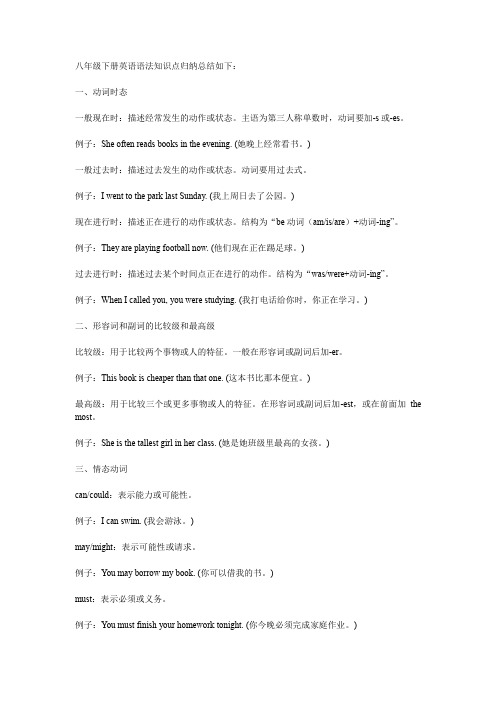
八年级下册英语语法知识点归纳总结如下:一、动词时态一般现在时:描述经常发生的动作或状态。
主语为第三人称单数时,动词要加-s或-es。
例子:She often reads books in the evening. (她晚上经常看书。
)一般过去时:描述过去发生的动作或状态。
动词要用过去式。
例子:I went to the park last Sunday. (我上周日去了公园。
)现在进行时:描述正在进行的动作或状态。
结构为“be动词(am/is/are)+动词-ing”。
例子:They are playing football now. (他们现在正在踢足球。
)过去进行时:描述过去某个时间点正在进行的动作。
结构为“was/were+动词-ing”。
例子:When I called you, you were studying. (我打电话给你时,你正在学习。
)二、形容词和副词的比较级和最高级比较级:用于比较两个事物或人的特征。
一般在形容词或副词后加-er。
例子:This book is cheaper than that one. (这本书比那本便宜。
)最高级:用于比较三个或更多事物或人的特征。
在形容词或副词后加-est,或在前面加the most。
例子:She is the tallest girl in her class. (她是她班级里最高的女孩。
)三、情态动词can/could:表示能力或可能性。
例子:I can swim. (我会游泳。
)may/might:表示可能性或请求。
例子:You may borrow my book. (你可以借我的书。
)must:表示必须或义务。
例子:You must finish your homework tonight. (你今晚必须完成家庭作业。
)四、被动语态被动语态用于描述事物的状态或描述被动发生的动作。
结构为“be动词(am/is/are/was/were)+动词的过去分词”。
八下英语第二单元重点
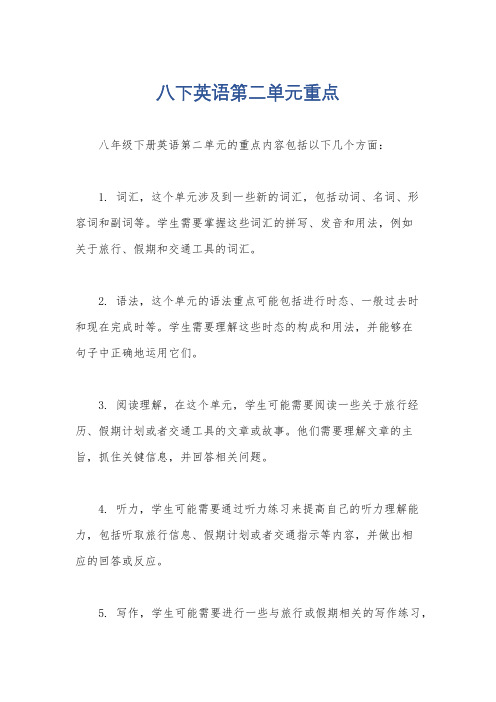
八下英语第二单元重点
八年级下册英语第二单元的重点内容包括以下几个方面:
1. 词汇,这个单元涉及到一些新的词汇,包括动词、名词、形
容词和副词等。
学生需要掌握这些词汇的拼写、发音和用法,例如
关于旅行、假期和交通工具的词汇。
2. 语法,这个单元的语法重点可能包括进行时态、一般过去时
和现在完成时等。
学生需要理解这些时态的构成和用法,并能够在
句子中正确地运用它们。
3. 阅读理解,在这个单元,学生可能需要阅读一些关于旅行经历、假期计划或者交通工具的文章或故事。
他们需要理解文章的主旨,抓住关键信息,并回答相关问题。
4. 听力,学生可能需要通过听力练习来提高自己的听力理解能力,包括听取旅行信息、假期计划或者交通指示等内容,并做出相
应的回答或反应。
5. 写作,学生可能需要进行一些与旅行或假期相关的写作练习,
比如写一篇关于自己假期计划的短文或者写一封给朋友的电子邮件,分享旅行经历。
总的来说,这个单元的重点是让学生掌握与旅行、假期和交通
工具相关的词汇、语法和表达能力,培养他们的阅读理解和听力理
解能力,同时提高他们的写作能力。
希望这些内容能够帮助你更好
地理解这个单元的重点。
八年级英语下册知识点汇总
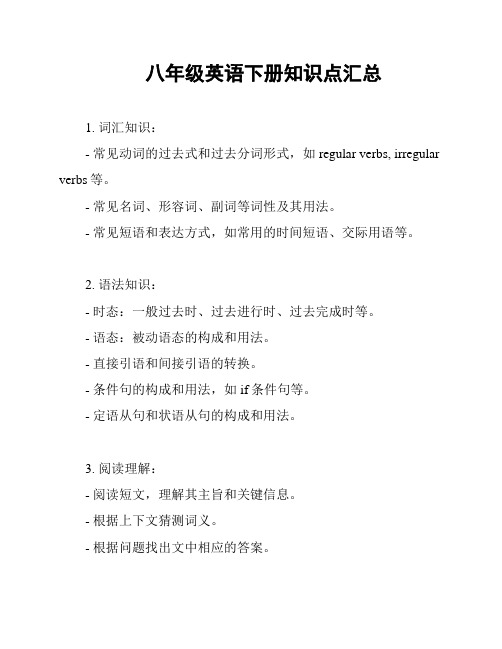
八年级英语下册知识点汇总
1. 词汇知识:
- 常见动词的过去式和过去分词形式,如regular verbs, irregular verbs等。
- 常见名词、形容词、副词等词性及其用法。
- 常见短语和表达方式,如常用的时间短语、交际用语等。
2. 语法知识:
- 时态:一般过去时、过去进行时、过去完成时等。
- 语态:被动语态的构成和用法。
- 直接引语和间接引语的转换。
- 条件句的构成和用法,如if条件句等。
- 定语从句和状语从句的构成和用法。
3. 阅读理解:
- 阅读短文,理解其主旨和关键信息。
- 根据上下文猜测词义。
- 根据问题找出文中相应的答案。
4. 写作技巧:
- 书面表达:写信、写作文等。
- 口头表达:进行简短的演讲、对话等。
- 语法和拼写的正确应用。
5. 听力技巧:
- 听取关键信息,如对话中的时间、地点、人物等。
- 根据对话内容回答问题。
- 培养对不同语速和语调的听力理解能力。
以上是八年级英语下册的主要知识点汇总,希望对你的学习有所帮助!。
八年级下册半期知识点英语
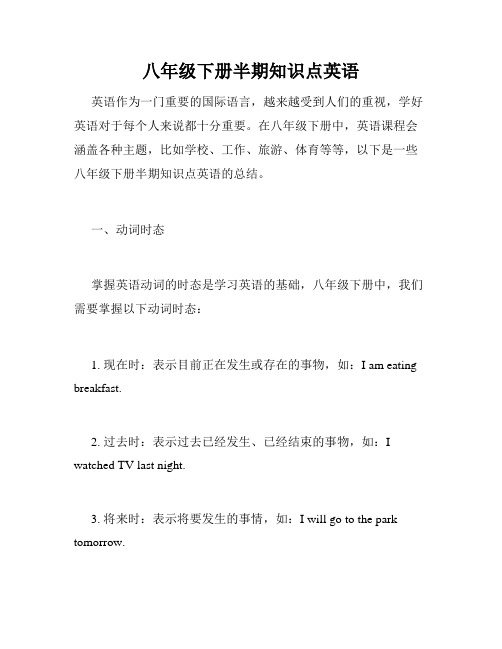
八年级下册半期知识点英语英语作为一门重要的国际语言,越来越受到人们的重视,学好英语对于每个人来说都十分重要。
在八年级下册中,英语课程会涵盖各种主题,比如学校、工作、旅游、体育等等,以下是一些八年级下册半期知识点英语的总结。
一、动词时态掌握英语动词的时态是学习英语的基础,八年级下册中,我们需要掌握以下动词时态:1. 现在时:表示目前正在发生或存在的事物,如:I am eating breakfast.2. 过去时:表示过去已经发生、已经结束的事物,如:I watched TV last night.3. 将来时:表示将要发生的事情,如:I will go to the park tomorrow.4. 现在进行时:表示正在进行的动作,如:I am studying English now.5. 过去进行时:表示在过去的某个时间正在进行的动作,如:I was playing basketball yesterday.6. 现在完成时:表示过去发生的事情对现在有影响的、仍在持续的情况,如:I have lived in Beijing for 3 years.7. 过去完成时:表示过去发生的动作在过去某一时间点已经完成,如:I had finished my homework when he came.二、情态动词情态动词在英语中被用来表示许多重要的语意。
八年级下册中,我们需要掌握以下情态动词:can、could、may、might、shall、should、will、would、must等。
1. can表示能力、本领,如:I can swim very well.2. could表示能力、过去的习惯或曾经的能力,如:I could swim when I was 5.3. may表示可能性、请求允许或询问允许,如:May I borrow your pen?4. might表示可能性、请求允许或询问允许,如:Might I use your computer for a while?5. shall表示应该、将要,如:Shall we go to the movie tonight?6. should表示应该、理应、该做,如:You should finish your homework before playing games.7. will表示意愿、预测、将来,如:I will go to New York next year.8. would表示愿意、过去经常发生的事情、假设语气,如:I would like a cup of coffee.9. must表示必须、强调性质、责任、义务等,如:You must finish your homework on time.三、从句在英语中,一个句子可以分为一个主句和一个或多个从句。
初二下册英语知识点归纳

初二下册英语知识点归纳1. 时态:- 一般现在时:表示经常性的动作、习惯、真理等。
- 现在进行时:表示正在进行的动作。
- 一般过去时:表示过去的某个时间发生的动作或存在的状态。
- 过去进行时:表示过去某个时间正在进行的动作。
- 将来时:表示将要发生的动作。
2. 名词:- 可数名词:可以单独表示一个或多个的名词。
- 不可数名词:不能用于复数形式的名词,只能作为整体来看待。
- 所有格:表示所属关系的名词形式,一般在名词后面加's。
3. 形容词:- 基本形容词:用于修饰名词。
- 比较级形容词:用于表示两者之间的比较。
- 最高级形容词:用于表示三者或三者以上的比较。
4. 副词:- 修饰动词、形容词或其他副词,用于表示程度、方式、时间等。
5. 代词:- 主格代词:作主语的代词形式。
- 宾格代词:作动词或介词的宾语的代词形式。
- 形容词性物主代词:表示所属关系的代词形式。
- 名词性物主代词:作为名词的代替。
6. 数词:- 基数词:表示数量的词。
- 序数词:表示顺序的词。
7. 冠词:- 定冠词:表示特指的冠词形式,即“the”。
- 不定冠词:表示泛指的冠词形式,即“a/an”。
8. 动词:- 及物动词:需要带宾语才能完成意义的动词。
- 不及物动词:不需要带宾语就能完成意义的动词。
- 动词不定式:由“to”加动词原形构成的短语。
9. 介词:- 用于连接名词、代词或动词与其他词语的词。
10. 连词:- 表示并列关系的连词,如“and, but, or”等。
- 表示选择关系的连词,如“either…or, neither…nor”等。
- 表示因果关系的连词,如“because, so, therefore”等。
11. 疑问句:- 一般疑问句:以助动词、情态动词或be动词开头的陈述句,问句式为“助动词/情态动词/be动词+主语+谓语?”- 特殊疑问句:用特殊疑问词引导的疑问句,如“what, when, where, who, which, why, how”等。
人教版八年级下册英语复习 Unit 4 重要短语、句型、重点讲解及作文范文

人教版八年级下册英语 Unit 4重要短语、句型、重点讲解及作文范文Unit 4 Why don’t you talk to your parents?一、重点短语1. have free time有空闲时间2. allow sb. to do sth. 允许某人做某事3. hang out with sb. 与某人闲逛4. after-school classes课外活动课5. get into a fight with sb. 与某人吵架/打架6. until midnight直到半夜7. talk to sb. 与某人交谈8. too many太多9. study too much学得过多10. get enough sleep有足够的睡眠11. write sb. a letter给某人写信12. call sb. up打电话给某人13. surprise sb. 令某人惊讶14. look through翻看15. be angry with sb. 生某人的气16. a big deal重要的事17. work out成功地发展;解决18. get on with不11睦相处;关系良:19. fight a lot经常吵架/打架20. hang over笼罩21. refuse to do sth. 拒绝做某事22. offer to do sth. 主动提出做某事23. so that以便24. mind sb. doing sth. 介意某人做某事25. all the time一直26. in future今后27. make sb. angry使某人生气28. worry about sth. 担心某事29. copy one’s homework抄袭某人的作业30. be oneself做自己31. family members32. spend time alone独自消磨时光33. give sb. pressure给某人施压34. have a fight with sb. 与某人吵架35. compete with sb. 与某人竞争36. free time activities业余活动37. get better grades取得更好的成绩38. give one’s opinion提出某人的观点39. learn exam skills学习应试技巧40. practice sports体育训练41. cause stress造成压力42. cut out删除第1页共12页二、重点句型1. I studied until mid night last night so I didn’t get enough sleep.我昨晚学习到半夜所以睡眠不足。
八年级下册英语一到三单元知识点

八年级下册英语一到三单元知识点那咱开始!一单元知识点。
1. 一般将来时。
- 这可是个重要的时态哦!表示将来要发生的动作或存在的状态。
常见的结构有“will + 动词原形”和“be going to + 动词原形”。
比如说,“I will go to Beijing next week.”(我下周要去北京。
)“He is going to have a party tomorrow.”(他明天要开个派对。
)- 要注意哦,will 比较随意,be going to 通常是有计划、有打算的。
2. 短语大集合。
- fall down (摔倒)想象一下,像个大冬瓜“扑通”一下倒地上。
- look for (寻找)别和 find 搞混啦,find 是“找到”,look for 是还在努力找的过程。
- in the future (在未来)未来嘛,充满了神秘和可能!二单元知识点。
1. 情态动词 could。
- could 这个小家伙,语气比 can 更委婉、更客气。
“Could you please help me?”(你能帮帮我吗?)比“Can you please help me?”听起来更有礼貌。
- 还有,could 还能是 can 的过去式,表示过去的能力。
2. 动词短语。
- cheer up (使高兴;使振奋)就像给心情打了一针兴奋剂!- give out (分发;散发)把东西一个一个发出去。
- come up with (想出;提出)脑袋里突然蹦出个好主意。
3. 感叹句。
- What + (a/an) + 形容词 + 名词 + (主语 + 谓语)!“What a beautiful flower!”(多美的花啊!)- How + 形容词/副词 + (主语 + 谓语)!像“How fast he runs!”(他跑得多快啊!)1. 过去进行时。
- 这是在讲过去某个时刻正在进行的动作。
结构是“was/were + 动词的现在分词”。
八年级英语下册知识点归纳总结
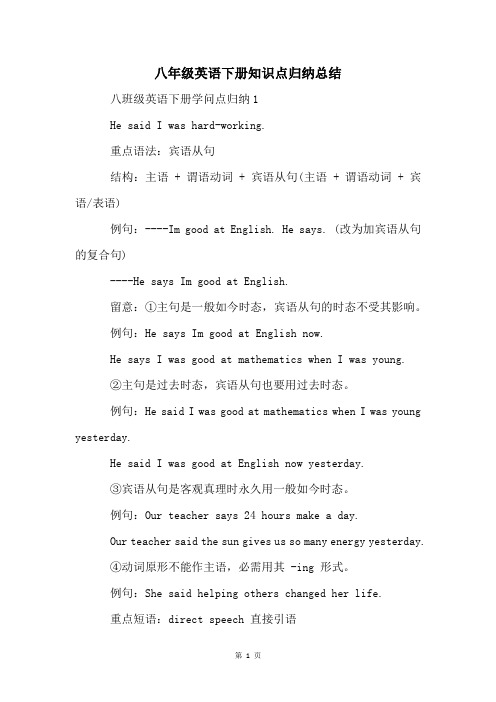
八年级英语下册知识点归纳总结八班级英语下册学问点归纳1He said I was hard-working.重点语法:宾语从句结构:主语 + 谓语动词 + 宾语从句(主语 + 谓语动词 + 宾语/表语)例句:----Im good at English. He says. (改为加宾语从句的复合句)----He says Im good at English.留意:①主句是一般如今时态,宾语从句的时态不受其影响。
例句:He says Im good at English now.He says I was good at mathematics when I was young.②主句是过去时态,宾语从句也要用过去时态。
例句:He said I was good at mathematics when I was young yesterday.He said I was good at English now yesterday.③宾语从句是客观真理时永久用一般如今时态。
例句:Our teacher says 24 hours make a day.Our teacher said the sun gives us so many energy yesterday.④动词原形不能作主语,必需用其 -ing 形式。
例句:She said helping others changed her life.重点短语:direct speech 直接引语reported speech = indirect speech 间接引语first of all = at first 首先pass on 传递be supposed to do sth. 应当做某事be good at = do well in 在某方面做得好in good health 身体健康get over 克服open up 打开care for = take care of = look after 照料;照看not any more = not any longer = no longer 不再have a cold 感冒end-of-year exam 年终考试get nervous 变得紧急forget to do sth. 遗忘做某事(该事未做)forget doing sth. 遗忘做某事(该事已做)its + adj. + [for sb.] + to do sth. 做某事[对某人来说](加形容词)context 上下文Reading Strategy(阅读方法)First read for meaning, not for detail. (首先理解文段的大致意思,不在于文段的详情部分。
八年级下册英语语法重点

八年级下册英语语法重点一、一般将来时1.基本结构:主语+ will/shall + 动词原形+ 其他。
2.用法:表示将来要发生的动作或状态。
常与表示将来的时间状语连用,如tomorrow, next week, next year等。
3.注意事项:在否定句中,有时可以用shall not代替will not。
二、现在完成时1.基本结构:主语+ have/has + 过去分词+ 其他。
2.用法:表示过去发生的动作对现在造成的影响或结果。
常与already, just, yet等副词连用。
3.注意事项:have/has gone to表示“去某地了”,have/has been to表示“曾经去过某地”。
三、情态动词1.基本结构:情态动词+ 动词原形+ 其他。
2.用法:表示说话人的语气或情态,如能、可以、应该等。
常用的情态动词有can, may, must, shall等。
3.注意事项:情态动词后接动词原形,不能接动词的-ing形式。
四、被动语态1.基本结构:主语+ be动词+ 过去分词+ 其他。
2.用法:表示主语是动作的接受者。
常与by引导的方式状语连用,如by machine, by air等。
3.注意事项:被动语态的时态变化主要通过be动词的变化来实现,不同时态的被动语态需要注意与该时态的主动语态相对应。
五、不定代词和冠词用法1.不定代词:表示泛指或不确定的代词,如some, any, other等。
some用于肯定句,any用于否定句或疑问句;other表示“其他的”。
2.冠词:表示特指或泛指的词,分为定冠词the和不定冠词a/an。
a用于辅音音素开头的单词前,an用于元音音素开头的单词前;the 表示特指或上文提到的某个名词。
3.用法:不定代词和冠词一起使用时,可以构成限定词短语,如some books, the school gate等。
限定词短语可以修饰名词,表示特指或泛指的概念。
4.注意事项:在英语中,不定代词和冠词的使用是有规则和限制的,需要根据上下文和语境来判断使用哪个代词或冠词。
八年级下册英语笔记重点归纳

八年级下册英语笔记重点归纳一、Unit 1 What's the matter?1. 重点单词。
- matter n.问题;事情。
常用搭配:What's the matter (with sb.)?(某人)怎么了?- have a cold 感冒。
类似的表达还有:have a fever(发烧),have a cough (咳嗽)等。
- stomachache n.胃痛;腹痛。
“-ache”为后缀,表示疼痛,如:headache (头痛),toothache(牙痛)。
- foot n.脚,复数形式为feet。
- lie v.躺;平躺。
lie - lay - lain。
例如:You should lie down and rest.(你应该躺下休息。
)- rest v. n.放松;休息。
如:take a rest(休息一下)。
2. 重点短语。
- take one's temperature 量体温。
例如:The nurse took my temperature.(护士给我量了体温。
)- take breaks (take a break) 休息。
We should take breaks when we are tired.(当我们累的时候应该休息。
)- get off 下车。
He got off the bus at the next stop.(他在下一站下了公共汽车。
)- to one's surprise 使……惊讶的是;出乎……的意料。
To my surprise, he passed the exam.(令我惊讶的是,他通过了考试。
)- What should I do? 我应该做什么?用于询问建议。
- You should see a dentist and get an X - ray. 你应该去看牙医并且拍个X 光片。
should为情态动词,后接动词原形,表示建议。
人教版八年级下册英语必考知识点梳理(期末复习必备)

人教版八年级下册英语必考知识点梳理(期末复习必备)八年级下册英语知识点Unit 1 What’s the matter?【重点短语】1.have a fever 发烧2.have a cough 咳嗽3.have a toothache 牙疼4.talk too much 说得太多5.drink enough water 喝足够的水6.have a cold 受凉;感冒7.have a stomachache 胃疼8.have a sore back 背疼9.have a sore throat 喉咙痛10. take risks 冒险11.hot tea with honey 加蜂蜜的热茶12.see a dentist 看牙医13.get an X-ray 拍X 光片14.take one’s temperature 量体温15.put some medicine on sth. 在……上面敷药16. give up 放弃17. sound like 听起来像18. all weekend 整个周末19. in the same way 以同样的方式20. go to a doctor 看医生21. go along 沿着……走22. on the side of the road 在马路边23. shout for help 大声呼救24. without thinking twice 没有多想25. get off 下车26. have a heart problem 有心脏病27. to one’s surprise 另某人惊讶的是28. thanks to 多亏了;由于29. in time 及时30. make a decision 做出决定31. get into trouble 造成麻烦32. right away 立刻;马上33. because of 由于34. get out of 离开;从……出来35. keep on doing sth. 继续或坚持做某事36. put a bandage on sth. 用绷带包扎37. fall down 摔倒38. feel sick 感到恶心39. have a nosebleed 流鼻血40. cut his knee 割伤他的膝盖41. put her head back 把她的头向后仰42. have problems breathing 呼吸困难43. mountain climbing 登山运动44. be used to doing sth. 习惯做某事45. run out (of) 用完;用尽46. so that 以便47. so...that... 如此……以至于...…48. be in control of 掌管;管理49. in a difficult situation 在闲境中【重点句型】1. What's the matter with you?= What'the trouble with you? = What's wrong with you? 你怎么了?2. What should she do? 她该怎么办呢?3.Should I take my temperature? 我应该量一下体温吗?4.You should lie down and rest. 你应该躺下休息一会儿。
新人教版八年级英语下册知识点归纳总结大全+课本练习参考答案

新人教版八年级英语下册知识点归纳总结大全+课本练习参考答案新人教版八年级英语下册知识点归纳总结复习大全Unti1 what’s the matter?短语归纳1.too much 太多2.lie down 躺下3.get an X-ray 做个X光检查4.take one ’s temperature 量体温5.put some medicine on ......在....上敷药6.have a fever 发烧7.take breaks /take a break 休息8.without thinking twice 没多想9.get off 下车10.take sb to the hospital 送某人去医院11.wait for等待12.to one’s surprise 使.......惊讶的thanks to多亏于;由于14.in time及时15.think about 考虑16.have a heart problem患有心脏病17.get into the trouble 遇到麻烦18.do the right thing做正确的事情事情19.fall down 摔倒20.put ...... on sth把...放在某物上21.get hit/sunburned 摔伤/烧伤22.be interested in 对.....感兴趣23.be used to 习惯于.... 24.take risks/take a risk 挑战25.lose one’s life 失去生命26.because of 因为27.run out of 用完28.cut off 切除29.get out of 从...出来30.make a decision/decisions 做决定31.be in control of 掌管;管理32.give up 放弃用法归纳1.need to do sth .需要去做某事2.see sb doing sth 看见某人正在做某事3.ask sb sth 询问某人某事4.expect sb to do sth 期望某人做某事5.agree to do sth 想要做某事6.help sb (to) do sth 帮助某人做某事7.want to do sth 想要做某事8.tell sb to do sth 告诉某人做某事9.have problems(in) doing sth 做某事有困难e sth to do sth用某物去做某事11.be/get used to doing sth 习惯于做某事12.seem to do sth 好像做某事13.keep on doing sth 继续做某事14.mind doing sth 介意做某事语法点1.询问某人的健康问题及遇到麻烦的表达方法2.情态动词should的用法情态动词should的用法表示劝告与建议,也表义务与责任第一人称问句中,征询建议要记清3.不定代词的用法相关阅读方法推理判断阅读法精细解读1. What’s the matter (with you)? 怎么了?出什么事了?What’s the trouble/ the problem / wrong with sb./ sth.?2. I had a cold.我感冒了。
八年级下册英语知识点

八年级下册英语知识点八年级下册英语知识点Module 2语法:现在完成时:表过去发生或已经完成的某一动作,对现在造成的影响和结果,或持续到现在的动作。
常用词语already, yet ,ever ,never,just ,before, for + some time ,since,1.表示某人的经历以及过去发生的动作对现在造成的影响,或结果,常与recently, ever, never, already, yet ,just, before连用;2.表示发生在过去并且一直持续到现在的动作或状态,常与for+时间段或since+时间点连用。
结构:have(has)+过去分词,动词的过去式及过去分词在末尾加ed 规则是:1.直接加ed ;2.以e 结尾的,加e ;3.以辅音字母加y 结尾的,变y 为i ,再加ed ;4.重读,末尾辅元辅,双写这个辅音字母,再加ed ;5,不规则变化知识点:1.enter参加,加入;进入,相当于join 或go into2 .maybe=perhaps大概,也许.放句首.3.win ,后接war ,match ,game; beat 打败,击败,后跟人. 打败某人,赢得比赛4.ever 用于疑问句时,其答语如果表示否定,用never 回答.5.before 以前. 从过去起的若干时间以前, 距过去某时…以前,常和完成时连用ago ,从现在起的若干时间以前跟今…以前,常用于过去时态中6.go on a holiday .去度假,强调动作. be on a holiday 也表示去度假,强调状态.7.afford 买得起,付得起,常与can ,could ,be able to 连用.8.stop doing sth.停止做某事(正在做的事不做了.)不做.stop to do sth .停下来(正在做的事)去做某事(另一件事)要做9.what a pity /That’s a pity .多遗憾啊.10.think of 想起,起出,认为 think about 思考,考虑两者区别:1)当表示”想起,想出”时,两者可以互换 2)当think of 表示”认为”时, 不能用think about3)当think about 表示”思考,研究”时,不能用think of .11. thanks for = thank you for+名词或动词ing 因……而感谢你 Thank you for helping me.13.invite sb. to do sth.邀请某人做某事 invite sb. to someplace邀请某人去某地.14.at the moment 此刻,现在,常与一般现在时或现在进行时连用.at that moment 在那时,常与一般过去时连用.15.one of +形容词最高级+名词复数,最…的之一,动词用三单形式.16.send sth .to do sth =send sb. sth 把某物寄给某人.17. 5. the + 姓氏s :……一家人,……夫妇 ,18. 1)have been to some place 去过某地(已回) ,后接once ,twice ,three ,times等表次数的词(短语)也可与just ,never ,ever ,连用,但不能与时间连用2) have gone to 到某地去了,(去了未回).3)have been in 已经在某地待了多长时间,常与一段时间连用.19.on ,in at 时间表达的用法:on 用于具休的某一天,及对早中晚进行了修饰后也用on ;in 用于年月季节,一段时间,以及单独的早中晚,如:in the morning ,in the afternoon ,in the evening ,at用于具体的时刻,几点,及一些固定搭配.20.ancient ,古老的,古代的, 反义词:modern ,现在的,当代的21.be different from ,与… 不同, 其反义:the same as .与…一样.22. find it +形容词to do sth.发现做某事是……的.23.mix up 混淆,拌和,调和 mix with 和…..混合24.ask sb. to do sth .要求某人做某事 ask sb. not to do sth .要求某人不做某事25.ask sb. about sth .询问某人关于某事 ask sb. for sth .向某人要某物ask for help 寻求帮助 26.count down 倒数,倒计时27.sth happened to sb .某人发生了某事. sb. happen to do sth .碰巧做某事28.all over the world 遍及世界 29.around the world 整个世界30.the rest of one’s life 某人的余生. 31.good luck好运八年级下册英语知识点大全Module 3.1.no problem 没问题2.the lastest news 最新的消息3.in order to 为了4.search for 寻找,搜索5.hunderds of 成百的6. a small part of 一小部分7.none ,既可指人,又可指物,用于三者或三者以上,常用于回答以how many /how much ,none of 没有一个,no one 只指人.不与of 连用.用于回答who 开头的问句.7. 8.take a photo of =take photos of =take pictures of =take a pictures9.so,与such的用法:1)当修饰可数名词单数时,用”such+a/an+形容词+名词.”或”so +形容词+a/an+名词.”2)当这些可数名词或不可数名词前有many ,much ,few ,little(表示少)修饰时,则用so .如:so many people ,so much money10.in space 在太空中, in the sky 在天空中.e back 回来 12.look for 寻找13.as ..as 像..一样 14.decide to do sth .决定做某事15.be named after以.. 名字命名 16.take after与…相像.17.be up to 正在做某事,忙于做某事 What are you up to ?=What are you doing ?18.be up to sb. 由..决定,由…负责19.yet 副词,还,尚,用于否定和疑问句句末;already ,已经,常用于肯定句中或句末.20.That’s why,这就是..的原因 ,后接结果.That’s because ,后接原因21.on the news 在新闻上 22.on a newspaper 表示(某物)在报纸上23.in a newspaper在报纸里(的内容).24.discover指发现原来已有但不为人知的事物;invent ,发明,即创造出前所未有的东西find out 查出真相,原理等 ,也可用于查看地时刻表等 ;find ,找到,发现,指寻找的结果look for 寻找 ,侧重指寻找的动作和过程.25.the noon 月亮,the +世界上独一无二的事物名词. 26,in order to 为了,表示目的,27.message ,口头传递的或书写的消息,可数名词, news ,通过新闻媒体发布的消息,不可数, information,指在阅读,谈话中特别关注的消息,情报,资料等,不可数.28.hundred,thousand,million,billion只有和of 一起时,才加s,跟了数字,不加s.30.none代词,没有一个,没有一人,一点儿也没有.通常用于三者或三者以上,既可指人也可指物,可与of 连用,可回答how many ; no one 只能指人,不能与of 连用.,可回答who .31.三到达:get to =arrive in (大地方)/at (小地方)=reach 跟地点副词时不用介词,不用reach32.take a photo of sb. 给某人照相,而且是给他本人照相;take a photo for 为某人照相,不一定有他本人. 33.enough 修饰名词放在前,修饰形容词和副词放在后.34.alone作表语,独自一方,个体单独 lonely作表语或定语,心里孤单,寂寞.municate with sb. 和某人交流话题写作:随着时代的进步、科技的发展,人们的生活发生了日新月异的变化。
人教版八年级英语下册复习知识点

人教版八年级英语下册复习知识点八年级英语下册复习知识1What were you doing when the rainstorm came?1. arrive at 到达(小地方)arrive in到达(大地方)reach 到达get to 到达I arrived in Beijing last night. = I reached Beijing last night .= I got to Beijing last night .如果宾语是副词here, there, home, 要把at/in/to省略。
arrive here/there/homeget here/there/home2. in front of… 在… 的前面 (某一范围外的前面)in the front of … 在… 的前面(某一范围内的前面)There are some big trees in front of the classroom building. 在教室的前面有一些大树。
I like sitting in the front of the taxi. 我喜欢坐在出租车的前排位置。
3. take off(1)起飞When did the plane take off yesterday? 飞机什么时候起飞?(2)脱下(衣帽等)He took off his coat as soon as he went into the room. 他一进房间就脱掉了外套。
(3)取消They will take off the 5 am train . 他们取消了早上5点的火车。
4. get out (of ) … 从……离开/出去/下来A car stopped and a girl got out of it.但从汽车/火车/船/飞机/马匹上下来, 用get off…5. follow(1)跟随 I followed him up he hill. 我跟着他上了山.(2)沿着……前进 Follow this road until you get to the post office. 顺着这条路一直到邮局.(3)听懂,理解Could you speak more slowly? I can’t follow you. 你能说慢点吗?我听不懂。
八年级英语仁爱版下知识点
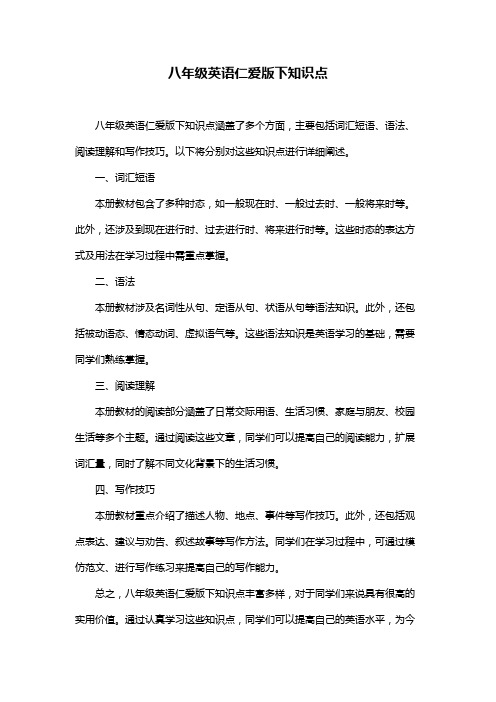
八年级英语仁爱版下知识点
八年级英语仁爱版下知识点涵盖了多个方面,主要包括词汇短语、语法、阅读理解和写作技巧。
以下将分别对这些知识点进行详细阐述。
一、词汇短语
本册教材包含了多种时态,如一般现在时、一般过去时、一般将来时等。
此外,还涉及到现在进行时、过去进行时、将来进行时等。
这些时态的表达方式及用法在学习过程中需重点掌握。
二、语法
本册教材涉及名词性从句、定语从句、状语从句等语法知识。
此外,还包括被动语态、情态动词、虚拟语气等。
这些语法知识是英语学习的基础,需要同学们熟练掌握。
三、阅读理解
本册教材的阅读部分涵盖了日常交际用语、生活习惯、家庭与朋友、校园生活等多个主题。
通过阅读这些文章,同学们可以提高自己的阅读能力,扩展词汇量,同时了解不同文化背景下的生活习惯。
四、写作技巧
本册教材重点介绍了描述人物、地点、事件等写作技巧。
此外,还包括观点表达、建议与劝告、叙述故事等写作方法。
同学们在学习过程中,可通过模仿范文、进行写作练习来提高自己的写作能力。
总之,八年级英语仁爱版下知识点丰富多样,对于同学们来说具有很高的实用价值。
通过认真学习这些知识点,同学们可以提高自己的英语水平,为今
后的学习打下坚实基础。
在学习过程中,要注重理论与实践相结合,及时巩固所学知识,不断提高自己的听、说、读、写能力。
(外研版)英语八年级下册总复习知识点考点
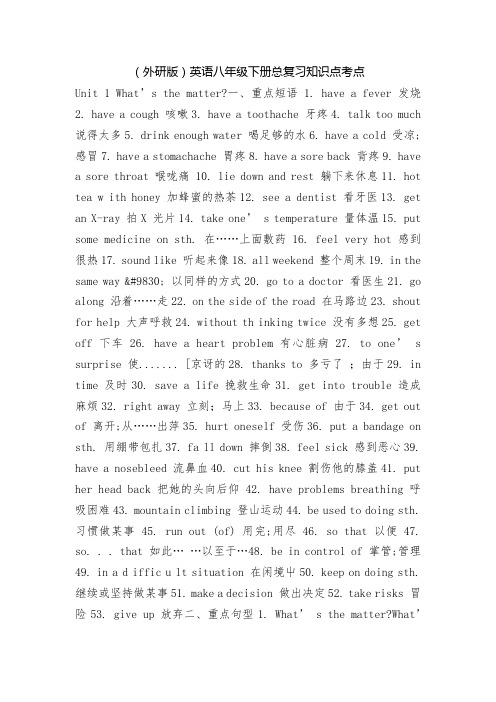
(外研版)英语八年级下册总复习知识点考点Unit 1 What’s the matter?一、重点短语 1. have a fever 发烧2. have a cough 咳嗽3. have a toothache 牙疼4. talk too much 说得太多5. drink enough water 喝足够的水6. have a cold 受凉;感冒7. have a stomachache 胃疼8. have a sore back 背疼9. have a sore throat 喉咙痛 10. lie down and rest 躺下来休息11. hot tea w ith honey 加蜂蜜的热茶12. see a dentist 看牙医13. get an X-ray 拍X 光片14. take one’ s temperature 量体温15. put some medicine on sth. 在……上面敷药16. feel very hot 感到很热17. sound like 听起来像18. all weekend 整个周末19. in the same way ♦ 以同样的方式20. go to a doctor 看医生21. go along 沿着……走22. on the side of the road 在马路边23. shout for help 大声呼救24. without th inking twice 没有多想25. get off 下车26. have a heart problem 有心脏病27. to one’ s surprise 使....... [京讶的28. thanks to 多亏了;由于29. in time 及时30. save a life 挽救生命31. get into trouble 造成麻烦32. right away 立刻;马上33. because of 由于34. get out of 离开;从……出萍35. hurt oneself 受伤36. put a bandage on sth. 用绷带包扎37. fa ll down 摔倒38. feel sick 感到恶心39. have a nosebleed 流鼻血40. cut his knee 割伤他的膝盖41. put her head back 把她的头向后仰42. have problems breathing 呼吸困难43. mountain climbing 登山运动44. be used to doing sth. 习惯做某事 45. run out (of) 用完;用尽46. so that 以便47. so. . . that 如此……以至于…48. be in control of 掌管;管理49. in a d iffic u lt situation 在闲境屮50. keep on doing sth. 继续或坚持做某事51. make a decision 做出决定52. take risks 冒险53. give up 放弃二、重点句型1. What’ s the matter?What’s the matter with you?= What’s the trouble with you?= What’s wrong with you?你怎么了?2. W hat should she do?她该怎么办呢?Should I take my temperature?我应该量一下体温吗?主语+ should/shouldn’t + 动词原形. ..①You should lie down and rest.你应该躺下休息一会儿。
八年级下册仁爱版英语知识点
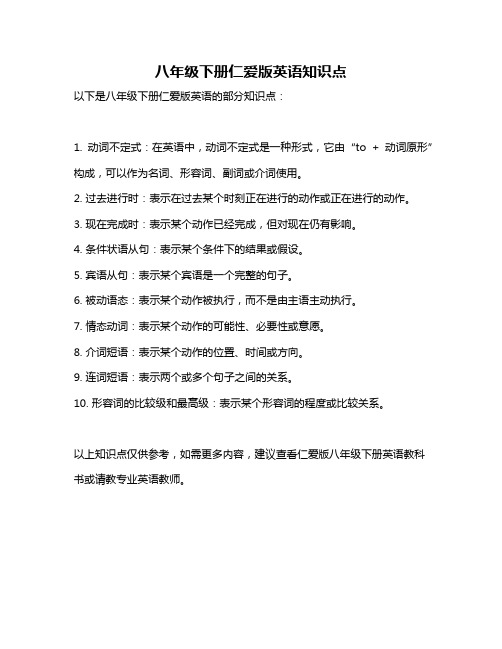
八年级下册仁爱版英语知识点
以下是八年级下册仁爱版英语的部分知识点:
1. 动词不定式:在英语中,动词不定式是一种形式,它由“to + 动词原形”构成,可以作为名词、形容词、副词或介词使用。
2. 过去进行时:表示在过去某个时刻正在进行的动作或正在进行的动作。
3. 现在完成时:表示某个动作已经完成,但对现在仍有影响。
4. 条件状语从句:表示某个条件下的结果或假设。
5. 宾语从句:表示某个宾语是一个完整的句子。
6. 被动语态:表示某个动作被执行,而不是由主语主动执行。
7. 情态动词:表示某个动作的可能性、必要性或意愿。
8. 介词短语:表示某个动作的位置、时间或方向。
9. 连词短语:表示两个或多个句子之间的关系。
10. 形容词的比较级和最高级:表示某个形容词的程度或比较关系。
以上知识点仅供参考,如需更多内容,建议查看仁爱版八年级下册英语教科书或请教专业英语教师。
八年级下册英语知识点总结

八年级下册英语知识点总结英语是一门广泛使用的语言,在全球范围内都有重要的地位。
作为一名八年级学生,学习英语是非常关键的。
下面将为大家总结八年级下册英语的重点知识点。
一、语法知识1. 直接引语和间接引语:直接引语是直接引用他人的原话,需使用引号标记;间接引语是将他人原话进行转述。
2. 时态:掌握一般现在时、一般过去时、一般将来时、现在进行时、过去进行时、现在完成时的基本用法和区别。
3. 被动语态:了解如何使用被动语态,即将主动语态句子中的主语变为动作的承受者,动词通过be动词词组和过去分词构成。
4. 宾语从句:了解宾语从句的构建规则,即将一个完整的句子作为宾语嵌入到主句中。
5. 并列连词:掌握如and、but、or等并列连词的使用,能够使用它们连接句子和短语。
二、词汇知识1. 同义词和反义词:学会辨别和使用同义词和反义词,能够丰富写作和口语中的表达。
2. 前缀和后缀:了解常见的前缀和后缀,可以通过改变单词的结构和含义,扩展词汇量。
3. 习惯用语和短语:学会使用一些习惯用语和短语,能够让你的英语更加地道和流利。
4. 近义词和辨析:掌握一些近义词和辨析词,能够在写作和阅读中正确使用它们。
三、句子结构和写作技巧1. 各种从句:了解各种从句的构建规则,如定语从句、主语从句、表语从句和状语从句,能够在写作中使用。
2. 书信写作:学会书写不同类型的书信,包括邀请信、道歉信、建议信等,了解书信的格式和常用句式。
3. 描述和说明:学会使用一些常用的描述性和说明性的句式,可以更清晰地表达自己的观点和观察。
四、阅读理解技巧1. 主旨大意题:通过阅读文段,掌握提取主旨和大意的技巧,能够准确回答相关问题。
2. 细节理解题:学会寻找文段中的细节,能够迅速找到相关信息并回答问题。
3. 推理判断题:理解文段的背景和内容,能够根据已有信息进行推理和判断。
4. 根据上下文猜测词义:通过上下文的提示和线索,能够猜测单词或短语的意义。
初二下册英语语法知识点总结归纳
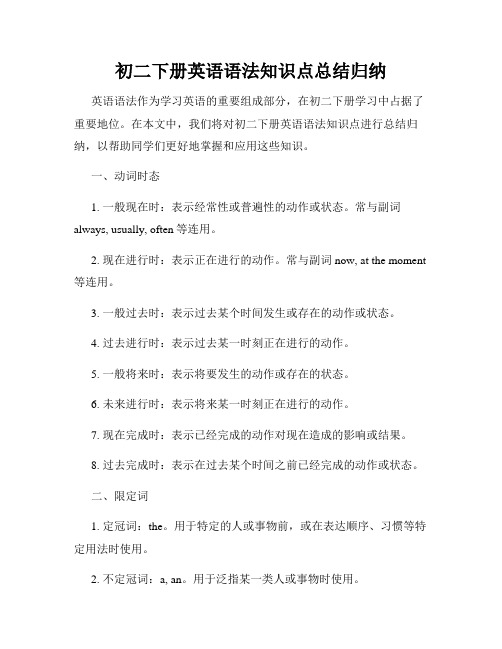
初二下册英语语法知识点总结归纳英语语法作为学习英语的重要组成部分,在初二下册学习中占据了重要地位。
在本文中,我们将对初二下册英语语法知识点进行总结归纳,以帮助同学们更好地掌握和应用这些知识。
一、动词时态1. 一般现在时:表示经常性或普遍性的动作或状态。
常与副词always, usually, often等连用。
2. 现在进行时:表示正在进行的动作。
常与副词now, at the moment 等连用。
3. 一般过去时:表示过去某个时间发生或存在的动作或状态。
4. 过去进行时:表示过去某一时刻正在进行的动作。
5. 一般将来时:表示将要发生的动作或存在的状态。
6. 未来进行时:表示将来某一时刻正在进行的动作。
7. 现在完成时:表示已经完成的动作对现在造成的影响或结果。
8. 过去完成时:表示在过去某个时间之前已经完成的动作或状态。
二、限定词1. 定冠词:the。
用于特定的人或事物前,或在表达顺序、习惯等特定用法时使用。
2. 不定冠词:a, an。
用于泛指某一类人或事物时使用。
3. 0冠词:不用于特指或泛指的情况下,直接使用名词。
4. 指示代词:this, that, these, those。
用于指示特定的人或事物。
5. 物主代词:my, your, his, her, its, our, their。
表示所属关系。
三、形容词和副词的比较级和最高级1. 一般形容词和副词的比较级和最高级:在一般情况下,形容词和副词的比较级在词尾加er,最高级在词尾加est。
2. 以e结尾的形容词和副词:在比较级和最高级前加r或st。
3. 以辅音字母+y结尾的形容词和副词:变y为i,再加er或est。
4. 双写结尾字母的形容词和副词:在比较级和最高级前双写结尾字母,再加er或est。
四、名词性从句1. 主语从句:由what, who, which, whether等引导的从句,在句子中作主语。
2. 宾语从句:由that, if, whether等引导的从句,在句子中作宾语。
人教版八年级下册英语期中复习重点语法知识点提纲(实用!)

人教版八年级下册英语期中复习重点语法知识点提纲Unit 1 What’s the matter?1.It doesn’t matter. 没关系2. ①What’s the matter (with sb./sth.)?②What’s the trouble (with sb./sth.)?③What’s wrong (with sb./sth.)?④What happened (to sb.)?3. have a headache / toothache/ stomachache/ backache 头痛/牙痛/胃痛/背痛have a sore throat 喉咙痛4. have a pain in the arm./ on my head. 胳膊痛/头痛5. have a (bad) cold 得(重)感冒have a fever / temperature 发烧have a cough 咳嗽have the flu 得流感6. lie down and rest 躺下休息(过去式:lay)tell a lie / tell lies 说谎8. take / have a (good) rest (好好)休息9. get an X-ray 拍个X光片10. take breaks/take a break 休息break into破门而入break down 坏了break out 爆发break rules 打破规则break one’s leg 摔断了腿11. get off /on上/下车+ a bus / train / planeget into 进入;上车+ a car / taxiget out of 从…出来;下车+ a car / taxi12. to one’s surprise 令某人惊讶的是to one’s joy 令某人高兴的是in surprise 惊讶地surprise sb.使某人惊讶be surprised at…对…惊讶13. be in trouble 处于麻烦中get into trouble 陷入困境have trouble/problems/difficulty (in) doing sth. 做某事有麻烦14. hit sb. on the + 硬部位(head、back等)hit sb. in the + 软部位(mouth、face等)get hit in / on + 部位…部位受到撞击15. right away 立即;马上(用于将来时)= at once / in a minute / right now16. be sick = be ill fall ill 生病a sick man 一个生病的人17. be / get used to doing sth. 习惯于做某事used to do sth. 过去常常做某事18. take a risk / take risks 冒险19. an accident 一场事故20.in a dangerous/safe situation处境危险/安全21. run out of +宾语run out(放在句末)22. cut off 切除;切断cut down 砍倒(cut them down)cut up 切碎(cut them up)cut…into…把…切成…23. mean doing sth. 意味着做某事mean to do sth. 打算做某事24. the importance of ... …的重要性25. make decisions / make a decision 做决定decide to do sth. 决定做某事26. be in control of 掌管;管理27. death n.死亡die v.死亡dead adj.死的dying adj.垂死的28. give up doing sth. 放弃give it upgive away 捐赠give out 分发;散发Unit 2 I’ll help to clean up the city parks.1.clean it up 打扫干净have a big clean-up 大扫除2. cheer sb. up 使某人振奋起来3.volunteer in / for…volunteer to do sth. 志愿做某事4. come up with 想出;提出catch up with 追上;赶上come out 出来;开花;出版come true 实现come up走近;走上前来come over 过来5. put off sth. / doing sth. 推迟put on 穿上;上演put up 支起;张贴put out伸出;熄灭put away把…收拾起来put down 放下6.see/hear/watch /find / notice sb. doing sth. see / hear / watch / find / notice sb. do sth.7.hand out 分发hand in 上交8.call up 打电话给(某人);征召9.feel lonel感觉孤独live alone独自生活10.care for=look after=take care of 照顾;照料11.be strong in=be good at/do well in 擅长…a strong feeling of satisfaction 极强的满足感12.to one’s satisfaction 令某人满意的是be satisfied / pleased with 对…满意13.the owner of …的主人on one’s own = by oneself = alone 独自地14.try out (for) 参加…选拔;试用15.go on a journey 去旅行16.raise money for 为…筹钱raise one’s hand / head 举手/ 抬头17.fix up 修理;装饰18.take after(外貌或行为)像=be similar to19.set up 建起;设立20.the disabled 残疾人(复数)21.make a difference to doing sth.对…产生影响22.the blind 盲人(复数)the deaf 耳朵失聪的人(复数)23.imagine doing sth. 想象做某事24.train sb. to do sth. 训练某人做某事25.be excited about…对…感到兴奋an exciting movie26.change one’s life 改变某人的生活27.take / have / show an interest in= be interested in 对…感兴趣28.make it possible to do sth.29.make sb. do sth.30.do what we can to help others31.so much homework / so interesting / such good adviceUnit 3 Could you please clean your room? take out the rubbish 倒垃圾throw the rubbish about 乱扔垃圾take out 拿出;取出take off 脱下;起飞take away 带走take up 开始做;占据fold one’s clothes 叠衣服sweep the floor 扫地make a mess 弄得一团糟be in a mess 乱七八糟throw down 扔下;随手丢下throw away 扔掉throw around / about 乱扔throw to…扔给…(无恶意)throw at 向…扔去(带攻击性)all the time 一直;总是,多用于句末neither+be/助动词/情态动词+主语“…也不”as soon as 一…就…(主将从现)pass sb. sth. = pass sth. to sb. 递给某人某物pass the exam 通过考试;考试及格borrow sth. from sb.向某人借来某物lend sb. sth. = lend sth. to sb. 借给某人某物要与一段时间连用时,只能用keep(保存;借了某物多长时间)hate doing / to do sth. 讨厌做某事do chores 做家务think for a while 想了一会儿without stress 没有压力under stress 在压力下a waste of time 一种时间的浪费waste time / money on sb. / sth. 在某人/某物上浪费时间/金钱waste time / money doing sth. 浪费时间/金钱做某事in order to do sth.=so as to do sth.为了做某事in order not to do sth. 为了不做某事in order that = so that + 从句“为了;以便”provide sb. with sth. = provide sth. for sb. 提供某人某物offer sb. sth. = offer sth. to sb.supply sb. with sth. = supply sth. for / to sb.depend on 依靠;依赖;取决于develop children’s independence培养孩子们的独立性with the development of…随着…的发展a developed country 发达国家a developing country 发展中国家It’s fair / unfair to do sth. 做某事是公平的/不公平的Unit 4 Why don’t you talk to your parents?1. allow sb. to do sth. 允许某人做某事allow doing sth. 允许做某事be allowed to do sth. 被允许做某事2. There is nothing / something wrong with……(没)有问题/毛病3. look through 快速查看;浏览look at = have a look at 看着look for 寻找look after 照顾look out 小心;看外面look out of…往…外看look up 查阅;向上看look forward to doing sth. 盼望做某事look over 仔细检查4. guess v.猜测;估计n.猜想I guess…与I think…类似(否定前移)5. big deal 重要的事It’s not a big deal. 没什么了不起的deal with sth. 处理6. work out 成功地发展;解决;算出work it out work out fine 奏效7.get on (well) with sb. 与某人相处得好= get along (well) with sb.= be good with sb.8. relation between A and B9. communication skills 沟通技巧communicate with sb./sth. 与.....交流/沟通10. argue with sb. = have an argument with sb. 与某人吵架argue with sb. about sth. 就某事与某人吵架11. black clouds 乌云12. my elder brother 我年长的哥哥older than13. instead 代替;反而;却(句末,也可放句首)instead of (doing) sth.代替;而不是(句中)14. be nervous about (doing) sth. 对…担忧15.offer sb. sth.=offer sth. to sb.提供某人某物offer to do sth.主动要求做某事16. explain sth. to sb. 向某人解释......explain + 从句/how to do sth.17. make sth. clear 使某事清楚易懂a clear blue sky 晴朗的蓝天18. copy homework 抄作业19. return sth. to sb 把某物还给某人return to + 地点回到某地20. not…anymore(句末) = no more(行前be后) 不再…(表程度或次数不再增加)not…any longer (句末) = no longer (行前be后) 不再…(时间上不再)21. family members 家庭成员a member of…一个…的成员22. under pressure 承受压力too much pressure 太多的压力23. compete with…和…竞争24. in one’s opinion 依某人看25. exam skills 考试技巧26. a typical American family一个典型的美国家庭27. cut out 删除;删去cut them outcut down 砍倒cut off 切断cut up 切碎cut into 切成28.have a quick dinner = have dinner quickly匆匆地吃晚饭29. continue v.持续;继续= go oncontinue doing sth. 继续做同一件事continue to do sth. 继续去做另一件事30. compare…with…把…与…比较compare…to…把…比作…31. be crazy about 对…着迷= lose oneself in32. push sb. to do sth. 督促某人做某事push the door 推门33. cause sb. to do sth. 导致某人做某事the cause of……的原因34. as usual 像往常一样35. perhaps adv.可能;大概= maybe 句首may be 可能是(放句中)36.提建议:Why don’t you do sth.? = Why not do sth.?How / What about doing sth.?Could you please (not) do sth.?Would you mind (not) doing sth.?Let’s do sth.You should (not) do sth..You’d better (not) do sth.You could do sth.Shall we do sth. ?37. on the phone / Internet / radio on TV38. find /see / hear / notice / watch sb. doing sth. 发现…某人正在做某事find /see / hear / notice / watch sb.do sth. 发现…某人做了某事39. be angry with sb.生某人的气=be mad atbe angry at sth. 对某事生气40. say sorry / hello / thanks / goodbye to sb.41.Hope things work out. 希望事情会好起来42. be always doing sth. 一直/总是做某事43.succeed / be successful in doing sth.成功做某事44. People shouldn’t push their kids so hard.人们不该对自己的孩子逼得太紧Unit 5 What were you doing when the rainstorm came?1. a heary rainstorm 强烈的暴风雨2. go off (闹钟)发出响声3. begin to do sth. / begin doing sth 开始做..4. rain / snow heavily / hard 下大雨/雪5. pick up 接电话;捡起;接送pick up the phone=answer the phone接电话6. a serious storm 一场严重的风暴7. a strong wind 一场大风blow strongly 刮大风8. report sth. to sb. 向某人报道/公布某事a news report 一篇新闻报道a weather report 天气预报It is / was reported that 从句据报道…9. in the area 在这个地区in the poor area 在贫困地区10.a piece of wood 一块木头wood n.森林(可数),常用复数11. beat v.敲打;打败;跳动------beatbeat sb. 打败某人heart stopped beating.12. against the walls 靠着墙be against doing sth. 反对做某事play against 和…比赛/对抗13. at first 起初;起先= in the beginning反义:at last / in the end 最后14. fall asleep 入睡;睡着feel sleepy 感觉困的15. die down 逐渐变弱;逐渐消失die out 灭绝die of死于内因die from死于外因16. rise 不及物动词,升起;提高,过去式:roseraise 及物动词17. fallen trees 倒下的树18. break sth. apart 把…分开cut sth. apart 切开keep sth. apart 使…分离19. Are you kidding? I’m just kidding.20.realize the importance of意识到…的重要性realize / achieve one’s dream=make one’s dream come true实现某人的梦想21. make one’s way to…前往…lose one’s way 迷路by the way 顺便问一下on one’s way to 在去…的路上in the way 妨碍;挡路in a way 在某种程度上22. completely shocked23. be shocked to do sth. 很震惊地做某事be shocked at 对…惊讶24. in silence 沉默(放句末)keep silent 保持沉默25. take down 拆除take down 写下;记录= write down26. to tell the truth= to be honest说实话;老实说27. at the time of 在…的时候28. wait for the bus 等公共汽车wait at the bus stop 在汽车站等待29.be busy with sth./be busy doing sth.忙于…30. take a hot / cold shower 洗热/冷水澡31. so many times 如此多次32. feel like ①感觉像…②想要feel like doing sth.33. make sure 确保make s ure of / make sure that…34. in times of difficulty 在困难时期35. by the side of the road 在马路边36. walk / go / pass by 路过/经过37. in history 在历史上in American history 在美国历史上38. was killed 被杀害,表被动(过去时)be + done 被动语态have / has + done 现在完成时39. the rest of…其余的…作主语时,谓语动词由后面的名词决定40. have meaning to sb. 对某人有特殊意义41.point out 指出point at 指着(近指)point to 指向(远指)Unit 6 An old man tried to move the mountains.1.shoot v.射击;发射,过去式:shotshoot:强调射击的结果,击中shoot at:朝…射击,强调射击的动作2. a big stone 一块大石头3. weak adj.虚弱的;无力的,反义词:strongfeel weak 感觉虚弱the weak 弱者;弱势群体be weak in= be poor in=do badly in 在…方面差4. remind sb. to do sth. 提醒某人做某事remind sb. of sb./sth. 使某人想起某人/某物remind sb.+that 从句提醒某人…5.a bit/a little bit/a little/kind of+adj./adv.有点…a bit of 少量;一些= a little +不可数名词6. turn…into…把…变成…turn的相关短语:turn on/off/up/dowm 打开/关闭/调高/调低turn left/right 向/右转turn over 翻过来in turn 轮流;依次take turns to do sth. 轮流做某事It’s one’s turn to do sth. 轮到某人做某事into的相关短语:break into 破门而入come into 进入cut into 把…切成…fall into 掉入;落入get int陷入run into 偶然撞见put one’s heart into 全神贯注于8. strange objects 奇怪的物体9. hide the tail 藏住尾巴10. a magic stick 一根魔力棒11. stick n.棍;棒v.粘贴;坚持(过去式:stuck)stick to doing sth. 坚持做某事12. excite sb. v.使某人激动13. western countries 西方国家east----eastern 东方的south----southern 南方的north----northern 北方的14. once upon a time = long long ago = a long time ago从前;很久以前15. fall in love with 爱上;喜欢上16. sth. fit sb. 某物适合某人be fit to do sth. 适合做某事be fit for 适合…keep fit / healthy 保持健康17. the couple 夫妻俩(作主语,谓语用复数)a couple of +名词复数一对;几个18. laugh at sb. 嘲笑某人smile at sb. 对某人微笑with a smile 带着微笑19. get married 结婚(短暂性)get married to sb. 与某人结婚marry sb. 嫁给某人/娶某人/与某人结婚20. a gold watch / medal 金表/ 金牌21. an emperor 一个皇帝22. cheat in the exam 考试作弊23. the whole family / night 全家/整晚all the children24. in the moonlight 在月光下25. shine bright 明亮地照耀26. on the ground 在地上27. lead v.带路;领路(过去式:led)the leader of …的领袖lead sb. to sp. 带领去某地lead sb. to do sth. 带领某人做某事lead to sth./doing sth. 导致…;通向…28. voice n.声音;嗓音(人或鸟)in a high/ low/tired voice 大声说/低声说/疲惫地说到sound:自然界的各种声音noise:噪音;嘈杂声make noise 制造噪音29. Journey to the West 西游记Yu Gong Moves a Mountain 愚公移山Hou Yi Shoots the Suns 后羿射日Nu Wa Repairs the Sky 女娲补天30. A man told Yu Gong that he could never do it.主句一般过去时,从句用相应的过去时31. work on sth./doing sth. 忙于…; 致力于...work for 为…工作/做事work as 作为…而工作work out 解决;算出32. be moved by sb. 被某人感动了33. finish doing sth. 完成做某事34. a good way to do sth. 做某事的好方法35. seem + adj. / n. seem to do sth.It seems that + 从句36. keep doing sth. 一直不停地做某事keep on doing sth. 继续做某事keep sb. doing sth.让某人一直做某事keep sb. from doing sth. 阻止某人做某事37. neither of + 名词复数/ 代词,作主语,谓语动词常用单数38. be able to 能够be unable to 不能够39. for the first time 第一次40. be not new to sb. 对某人来说不新鲜41. in fact=as a matter of fact 事实上;实际上42. at other times 在其他时候44.Keep sth. for oneself 为自己保留某物keep sth. to oneself 保守秘密45.make / cook / buy sth. for sb.46.along the way 沿路47.be / get lost = lose one’s way 迷路48.pieces of bread 面包屑49.never mind!没关系;不要紧50.find one’s way out 找到出路51. What + a/an+形容词+可数名词单数+主语+谓语!What +形容词+可数名词复数+主语+谓语!What +形容词+不可数名词+主语+谓语!How +形容词/ 副词+主语+谓语!52.be made of 由…制成(看得出原材料)be made from 由…制成(看不出原材料)be made by + sb. / handbe made in +地点be made up of 由…组成。
- 1、下载文档前请自行甄别文档内容的完整性,平台不提供额外的编辑、内容补充、找答案等附加服务。
- 2、"仅部分预览"的文档,不可在线预览部分如存在完整性等问题,可反馈申请退款(可完整预览的文档不适用该条件!)。
- 3、如文档侵犯您的权益,请联系客服反馈,我们会尽快为您处理(人工客服工作时间:9:00-18:30)。
八年级英语下册复习要点Unit 1将来时态构成 will +动词原形更 fewer(可数) more 更多、可、不可数均可少 less(不可数)There will be fewer trees 将有更少的树There will be less pollution 将有更少的污染There will be more trees 将有更多的树There will be more pollution 将有更多的污染In one’s home 在某人的家 be free 免费、空闲Study at home on computers 通过电脑在家学习Live to be 200 years old 活到200岁five years ago 五年前(when)过去时态in five years 五年后(How soon)将来时态on a space station 在太空站 fall in love with…爱上……live alone 独自居住 == live(all)by oneselfkeep / have a pet 养一个宠物 wear a suit 穿套装win awards 获奖 come true 实现one of the biggest movie companies is 最大的电影公司之一let/make/see sb do sth 让/使/看见某人做某事 in the future 在将来science fiction movies 科幻片 help…with 帮助某人某事hundreds of …数百的…… wake up 醒来,叫醒be able to/can 能、可以 over and over again 一遍又一遍would like to do sth == want to do sth 想做某事get bored 感到厌倦 try to do sth 努力做某事some … others …有的……有的…… on a piece of paper 在一张纸上There are already robots working in factories 已经有机器人在工厂工作It’s difficult/easy/necessary for sb to do sth对某人做某事困难/容易/必需 take turns doing sth 轮流做某事such robots 这种机器人 look for 寻找 find 找到……lonely 孤独的a lonely house/kid 一座孤零的房子,一个孤独的孩子【定语】He feels lonely 他感到孤独(表语)alone 独自、单独、做表语、状语== all by oneself 独自如:He is alone at home. 他独自在家.(表语) He does home homework alone/(all) by himself.他独自在家做作业.[状语]Unit 2want sb to do sth 想某人做某事 stay at home 呆在家argue with sb 与某人争吵 out of style 过时in style 时尚 write sb a letter 给某人写信call sb up 给某人打电话 talk about 讨论on the phone 在通话 get a part-time job 得到一份兼职工作keep sth for 借一段时间 have a bake sale 卖烧烤borrow sth from sb 向某人借某物 either 也,用于否定句尾lend sth to sb 借某物给某人 ask sb for sth 向某人要某物get a tutor 找一个家教 the same as 与……一样tell sb(not)to do sth 叫某人(不)做某事look for 寻找 find out 找到、查明、了解leave homework at home 把家庭作业遗忘在家invite sb to do sth 邀请某人做某事 fit…into…找到时间(做某事)be angry with sb 生某人的气 as…as possible 尽可能fail the test 考试不及格 pass the test 通过考试get on well with sb 与某人相处融洽 some advice 一些建议have a fight with sb 与某人打架 return = give back 归还busy enough 很繁忙 It’s time for sth 该做某事了complain about doing sth 抱怨做某事 The Taylors 特靳一家compare … with …把…和…做比较 send sb to…送某人去某地all kinds of 各种各样的 on the one hand 一方面on the other hand 另一方面 organized activities 有组织的活动not…until 直…才(非延续性动词)He didn’t go to bed until 10 o’clock. until 直…才(延续性动词) He worked until 10 o’clock. They find it difficult to plan things for themselves他们发现独立计划事情有麻烦 I don’t know what to do 我不知道做什么Unit 3in front of…在……前面 cut hair 理发in the front of 在某物内部前面 sleep late 睡过头make a milk shake 制作奶昔 cook dinner 煮晚饭get out of the shower 走出浴室 talk on the phone 在通话the museum of Flight 飞行博物馆 jump down 跳下climb a tree 爬树 walk around 四处走动think about 考虑 look outside 向外看get out of bed 起床 at the doctor’s 在诊所everyday activities 日常活动 hear about 听说in silence 沉默地 take place 发生have meaning to 对…有意义 not all 并非in space 在太空police 复数名词,如:the police were coming 警察来了How strange it was! 它是多么奇怪啊!]The boy was walking down the street when the uFo landed .当飞碟降落时,这个男孩子正在街上走。
While the boy was walking down the street ,the uFo landed.当这个男孩正在街上走时,飞碟降落了。
Unit 4be mad at == be angry with sb 很生某人的气have a surprise party 有个惊奇的晚会First of all 首先 return sth to sb 归还某人某物be good at 擅长做某事 return sb sthdo well in 擅长做某事 give back 归还keep / be in good health 保持健康 be / keep /stay healthy 保持健康get over 战胜、原谅、 report card 成绩报告单get nervous 感到紧张 have hard time with sth 做某事很吃力、困难disappointing result 令人失望的结果 end—of—year exams 年终考试I find science really difficult 我发现理科的确很难。
News 不可数名词 a piece of news 一条消息Pass on 传递 copy homework 抄家庭作业have a big fight with sb 与某人打了一大架one-year program 一年的计划 at first 首先feel sick 感到恶心 feel lucky 感到幸运open up 打开 return to …回到… in one’s life 一生after doing sth 做完某事之后 care for 关心Unit 5Wear jeans 穿牛仔裤 watch a video 看录像带Make some food 做一些食物 bring…to 带来Take away 带走,没收 go to college 去上大学be famous for 因…闻名 get an education 接受教育travel around the world 环游世界 make a lot of money 赚许多钱become a professional soccer player 成为一名专职足球运动员make a living 谋生 a lot of work 许多工作all the time 一直 get injured 受伤have a difficult time doing sth 做某事有困难why not do sth 何不做某事 in fact 事实上If you go to the party, you’ll have a good time.如果你去参加聚会,你将过得很愉快。
(主将从现)She won’t pass the test if she doesn’t work hard.如果她不努力,她将不能通过考试。
He will be famous if he joins the lion.Unit 6 现在完成进行时构成:“Have / has been + 动词ing”构成,表示从过去开始一直延续到现在的动作,还有可能延续到将来。
(for , since)I have been sitting here for an hour . 我在这儿坐了一小时了。
He has been learning English since three years ago.他一直在学英语自从三年前以来。
She has been skating since she was seven years old .她一直在滑冰,自从她七岁以来。
